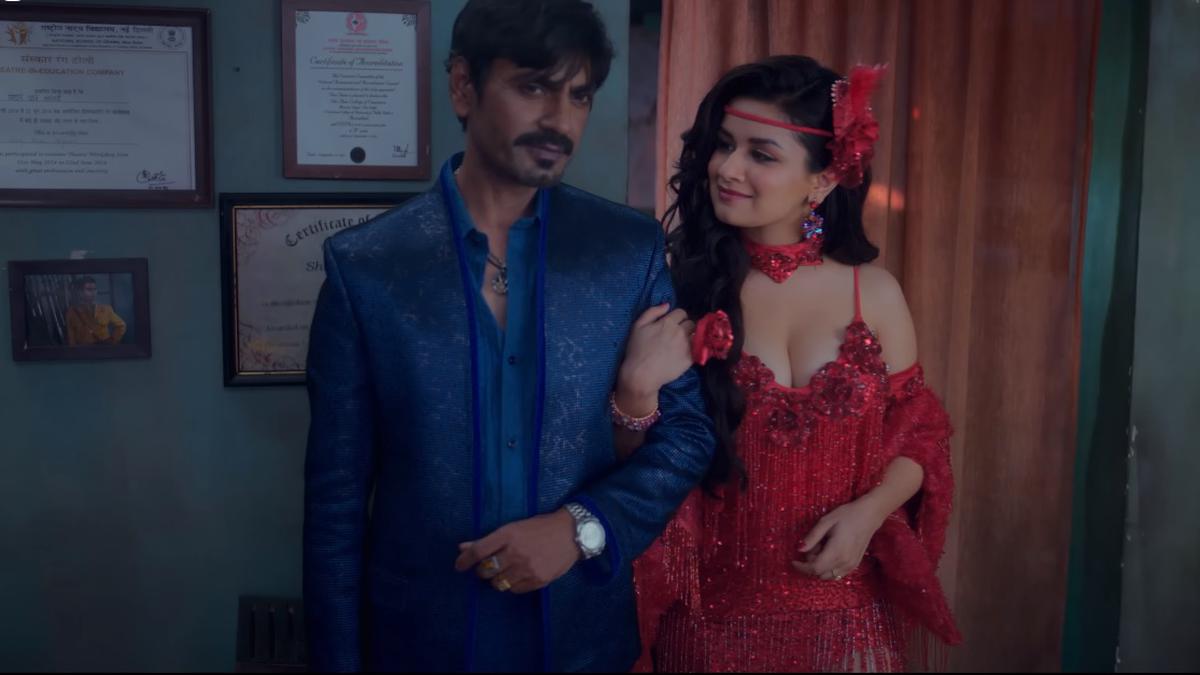
‘Tiku Weds Sheru’ movie review: Nawazuddin Siddiqui is out of tricks in bittersweet romance
The Hindu
Avneet Kaur is the surprise package of ‘Tiku Weds Sheru,’ which has some heart and a lot of needless quirks
You may remember Nawazuddin Siddiqui as the luckless aspiring screenwriter from the 2020 online release Ghoomketu. Three years on, Siddiqui has changed tracks. Perhaps realising the limited prospects of struggling film writers, he turns up, in Sai Kabir’s romantic comedy Tiku Weds Sheru, as a struggling actor. It’s hard not to spot a tinge of autobiography: Siddiqui, for many years, struggled silently and resolutely before breaking out as an actor. You’d expect his life experiences to rub off emotionally on his films. Yet, somehow, they feel more caricaturish than heartfelt.
Shiraz Khan Afgani (Siddiqui) — who goes by the more manageable Sheru — walks with an almighty spring in his step, strutting into frames he’s meant to orbit. He is a ‘junior artist’, the kind of person who cradles babies and sips drinks in the backgrounds of Hindi films. On his brother’s urging, Sheru travels from Mumbai to Bhopal to meet a prospective bride. The girl, Tasneem (Avneet Kaur), or Tiku, turns out much younger than him, though no one seems to mind and Sheru is offered a dowry. Tiku initially spurns his hand in marriage, then accepts, using it as her ticket to reach Mumbai. Unbeknownst to Sheru for the moment, Tiku wants to be an actor as well.
Sheru has secrets, too. He had drowned a local gangster’s money in a self-funded film project (‘Going Single’ was the uninspiring title) and is now unable to pay up. He gets by arranging prostitutes for sleazy patrons, a fact he withholds from his wife when they start their new life in his one-room apartment. Tiku, meanwhile, is left pregnant and tricked from a past affair. She tries to kill herself, twice, finally relenting when she finds in Sheru a kindred spirit of movie-crazed adaptability. They go on a date, a night of gaudy outfits and klutzy dancing that culminates funnily, yet emotionally, on the beach.
The Bhopal scenes put me in mind of the Muslim socials that were made in the 70s and 80s. Once the story returned to Mumbai, however, the influences became clearer. Rab Ne Bana Di Jodi looms large — a young girl stuck in a marriage with an older man, with movies as the bridge — as does the grittier Main Madhuri Dixit Banna Chahti Hoon. Like the latter example, Kabir’s film is set in the underbelly of Bollywood, with references to drug busts and casting couch. The film frequently, at times desperately, talks in an argot Bollywood fans will recognize. “I’m an outsider too,” Tiku yells when producer Kangana Ranaut turns up for a cameo.
As any lover of Hindi movies would, I found myself slipping for Mohit Chauhan and Shreya Ghoshal’s voices on the soundtrack (Aman Pant whips up a swoony, bittersweet score). 21-year-old Kaur is the film’s surprise package and is especially spirited in the second half. She finds pathos in Tiku’s dreaminess, the kind of moony small-town girl who’d append ‘to infinity’ to her declarations of love. Siddiqui, though, has played quirky and colourful so often there is really nothing new to see. For some reason, he continues to be obsessed with drag outfits and fragmented English, elements that, when not perpetuating stereotypes, terribly limit his comic repertoire. Tiku Weds Sheru has the goods of a moving love story. But it does not deliver.
Tiku Weds Sheru is streaming on Prime Video

National Press Day (November 16) was last week, and, as an entertainment journalist, I decided to base this column on a topic that is as personal as it is relevant — films on journalism and journalists. Journalism’s evolution has been depicted throughout the last 100-odd years thanks to pop culture, and the life and work of journalists have made for a wealth of memorable cinema.










